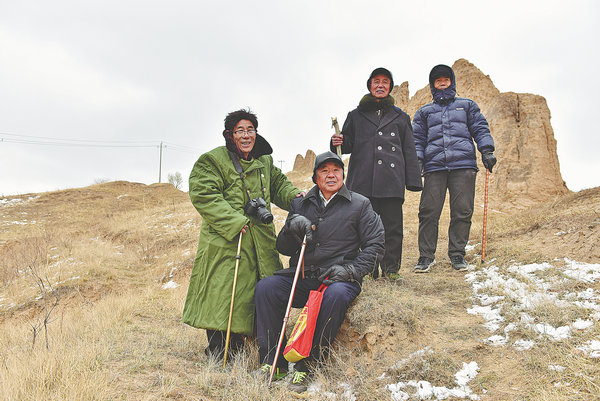The Great Wall and its many unsung heroes


'Four old lunatics' have been protecting the root of a village's culture and history.
Since a local feudal lord built a barbican on the approach to the then Great Wall in today's Yingxian county, Shanxi province, and named it Beiloukou in 344 BC during the Warring States Period (475 BC-221 BC), it has developed into one of the 200 major passes of the Great Wall.
But for most of the time over the past more than 2,000 years, Beiloukou served as a trade hub and a crossroad between Central China and Mongolia, Central Asia and Russia where people of different cultures met and intermingled. It gradually developed into a big town with hundreds of shops and more than 200 temples in its heyday.
But after sea transportation became the main means of China's foreign trade during the late Qing Dynasty (1644-1911), Beiloukou's fortunes, like those of the other land ports in North China along the Great Wall, started declining. Today, Beiloukou is like any other ordinary village in the region, except that the ruins of the Great Wall which is largely made of rammed earth, hay, bricks and sundry other building materials, and is more than 6 meters high and several meters wide with grass growing on its thatched top.
It was common practice among the local villagers to build their pigsties, sheep pens and hen coops with bricks from the Great Wall, because they are stronger than the modern ones.
Although the Great Wall Protection Regulations came into effect in 2006, it was not until what locals call the "four old lunatics" started patrolling the Great Wall in Beiloukou in 2009 that local farmers stopped "stealing" bricks from the crumbling structure. Something they had taken for granted for generations, thinking the Great Wall, just like any mountain, was a valuable source of free quality bricks and good rammed earth, or a place where cave-dwellers dug small holes which served as temporary sheds for shepherds.
The "four old lunatics" who started patrolling along the Great Wall in 2009 are Li Shisheng, 86, Liu Shenglong, 79, Nie Tianfu, 77, and Chang Liang, 72. Li used to be a reporter for a newspaper, Liu is a doctor, Nie an accountant, and Chang was a township civil servant before retirement. All of them were born in Yingxian and are obsessed with the history of Beiloukou.
They volunteered to patrol the Great Wall because of their interest in local history, commitment to their hometown and their shared concern about the poor protection of the Great Wall. In short, they wanted to "do something" that would make the rest of their life more meaningful.
Talking about their age, Nie jokingly said: "Since the youngest villagers in Beiloukou are more than 50 years old, as all young farmers have left the village to work as migrant workers in cities, we are the middle-aged residents here."




































